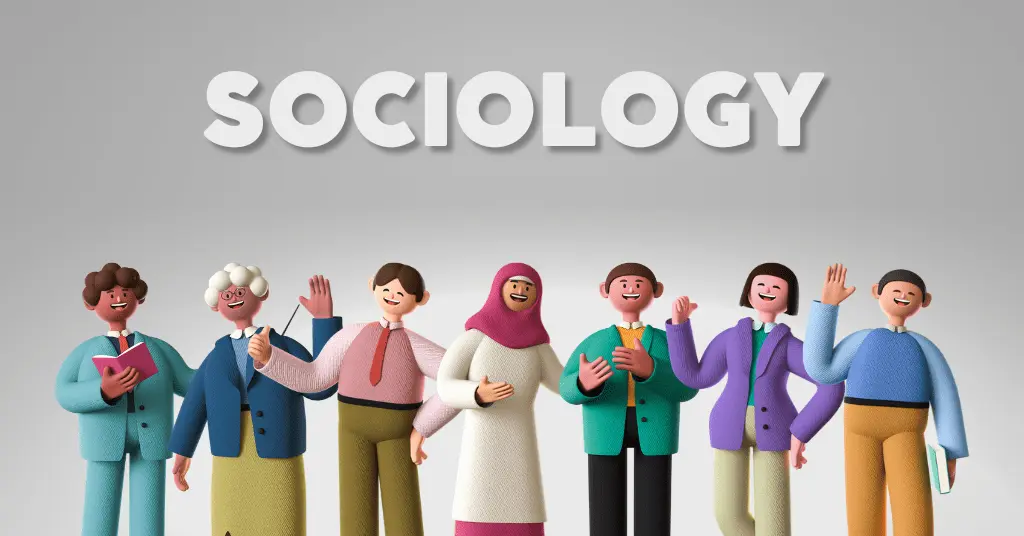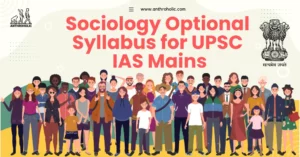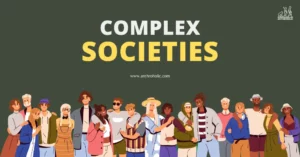AI Answer Evaluation Platform Live Now. Try Free Answer Evaluation Now
Sociology
Sociology is the scientific study of human society, social interactions, and the patterns of relationships between individuals and groups. It seeks to understand how societies are formed, maintained, and changed over time, as well as how social institutions and structures influence human behavior. In this comprehensive exploration of sociology, we will delve into the history and development of the discipline, its various sub-fields and focus areas, the latest research trends, and the career opportunities available to those interested in this fascinating subject.

History & Development of Sociology
The origins of sociology can be traced back to the works of early philosophers like Plato and Aristotle, who were interested in understanding the nature of human societies. However, sociology as a distinct academic discipline emerged in the 19th century as a response to the rapid social and economic changes brought about by the Industrial Revolution [1].
Auguste Comte, a French philosopher, is often regarded as the “father of sociology.” He coined the term “sociology” in 1838 and sought to establish it as a systematic and empirical science, distinct from philosophy and other social sciences [2]. Other early sociologists, such as Emile Durkheim, Max Weber, and Karl Marx, also made significant contributions to the development of the field by developing key concepts and theories that continue to shape sociological thought today.
Over the years, sociology has evolved and expanded, incorporating new theoretical perspectives, research methodologies, and subject areas. In the 20th century, major developments in sociology included the rise of functionalism, conflict theory, symbolic interactionism, and the emergence of feminist, postmodern, and critical perspectives.
Sub-Fields and Focus Areas in Sociology
Sociology is a diverse discipline, encompassing a wide range of sub-fields and focus areas. Some of the major sub-fields include:
- Social Theory: This sub-field is concerned with developing and evaluating theoretical frameworks to explain social phenomena and human behavior [3].
- Social Stratification: This area focuses on the study of social inequality, examining the distribution of resources, power, and opportunities across different social groups and the impact of these disparities on individuals and society as a whole [4].
- Cultural Sociology: This sub-field investigates the role of culture in shaping social life, including the production, diffusion, and consumption of cultural symbols, values, and practices [5].
- Political Sociology: This area examines the relationship between political institutions, processes, and social structures, as well as the impact of power dynamics on societal outcomes [6].
- Economic Sociology: This sub-field explores the social aspects of economic life, including the organization and functioning of markets, the role of social networks in economic exchange, and the impact of economic institutions on social outcomes [7].
- Environmental Sociology: This area investigates the interactions between societies and their natural environments, focusing on issues such as sustainability, environmental inequality, and the social dimensions of environmental change [8].
- Medical Sociology: This sub-field examines the social dimensions of health, illness, and healthcare, including the social determinants of health, the organization and delivery of healthcare services, and the experiences of patients and healthcare providers [9].
Methodologies in Sociological Research
Sociology utilizes a variety of research methods to collect and analyze data about social phenomena. These methodologies can be broadly categorized into qualitative and quantitative approaches:
- Quantitative Methods: Quantitative research in sociology involves the collection of numerical data to describe, explain, or predict social phenomena. This type of research often relies on statistical analysis to identify patterns, relationships, and trends in the data. Common quantitative research methods include surveys, experiments, and secondary data analysis [15].
- Qualitative Methods: Qualitative research in sociology seeks to gain a deeper understanding of social phenomena by focusing on the meanings, experiences, and perspectives of the individuals and groups involved. This type of research often involves the collection of non-numerical data, such as interview transcripts, field notes, or textual materials. Common qualitative research methods include in-depth interviews, participant observation, and content analysis [16].
Many sociologists also employ mixed methods research, which combines elements of both quantitative and qualitative approaches to provide a more comprehensive understanding of social phenomena [17].
Prominent Sociological Theories
Sociology is home to a variety of theoretical perspectives that help guide research and explain social phenomena. Some of the most influential sociological theories include:
- Functionalism: This perspective, also known as structural functionalism, posits that society is a complex system of interconnected parts that work together to maintain social stability and order. Key proponents of functionalism include Emile Durkheim and Talcott Parsons [18].
- Conflict Theory: This perspective emphasizes the role of power, inequality, and social conflict in shaping society. It argues that social order is maintained through the domination of certain groups over others. Key figures in the development of conflict theory include Karl Marx, Max Weber, and C. Wright Mills [19].
- Symbolic Interactionism: This micro-level perspective focuses on the role of symbols, language, and face-to-face interactions in shaping social reality. It posits that individuals construct their social world through ongoing interactions with others. Key figures in the development of symbolic interactionism include George Herbert Mead, Erving Goffman, and Herbert Blumer [20].
- Feminist Theory: This perspective examines the ways in which gender shapes social structures, institutions, and experiences. Feminist theory seeks to challenge and change gender-based inequalities and injustices. Key figures in the development of feminist theory include Simone de Beauvoir, bell hooks, and Patricia Hill Collins [21].
Sociology’s Impact on Society
Sociology has had a significant impact on society by shedding light on important social issues, informing public policy, and fostering social change. Some examples of the discipline’s contributions to society include:
- Research on social inequality and stratification has led to the development of policies aimed at reducing disparities in income, education, and health [22].
- Studies on crime and deviance have informed criminal justice policies and practices, such as community policing and rehabilitation programs [23].
- Research on race and ethnicity has contributed to the understanding of prejudice, discrimination, and the impact of immigration on receiving societies [24].
- Investigations into the family, gender roles, and sexuality have led to policy changes in areas such as marriage, adoption, and workplace equality [25].
Sociology’s influence extends beyond academia and policy-making, as it also plays a vital role in raising public awareness of social issues and promoting civic engagement.
Latest Research in Sociology
Contemporary sociological research is highly diverse and interdisciplinary, often drawing on insights from other fields like psychology, economics, and anthropology. Some of the most exciting and cutting-edge research areas in sociology today include:
- The impact of digital technologies and social media on social relationships, communication, and the formation of collective identities [10].
- The study of social networks and their influence on a wide range of outcomes, such as health, happiness, and economic success [11].
- The exploration of the complex relationships between globalization, migration, and cultural diversity, as well as the implications of these processes for social cohesion and inequality [12].
- The analysis of the intersections between race, gender, class, and sexuality, and how these intersecting identities shape experiences of discrimination, privilege, and social inclusion [13].
- The investigation of the causes and consequences of climate change from a sociological perspective, including the role of social institutions, values, and practices in driving and responding to environmental challenges [14].
Career Opportunities in Sociology
A degree in sociology provides a strong foundation for a variety of career paths, as it equips graduates with valuable analytical, research, and communication skills. Some of the most common career options for sociology graduates include:
- Academia: Many sociologists choose to pursue careers in teaching and research at colleges and universities, where they can contribute to the development of the discipline and inspire the next generation of sociologists.
- Policy Analysis and Development: Sociologists are well-suited for roles in government agencies, think tanks, and non-governmental organizations, where they can use their expertise to analyze social issues and inform the development of effective policies and programs.
- Market Research and Data Analysis: Sociologists with strong quantitative skills are in high demand in the private sector, where they can work as market researchers, data analysts, or consultants, helping businesses to understand and respond to consumer trends and preferences.
- Social Work and Human Services: Some sociology graduates choose to apply their knowledge of social issues and human behavior in careers that directly support individuals and communities, such as social work, counseling, or community development.
- Journalism and Media: Sociologists’ strong communication skills and understanding of social issues make them well-suited for careers in journalism, public relations, and other media-related fields.
Sociology in Everyday Life
Sociology also has practical applications in everyday life, as it helps individuals develop a deeper understanding of the social world and their place within it. By studying sociology, people can:
- Recognize and challenge stereotypes and prejudices that contribute to social inequalities.
- Develop a more informed and empathetic understanding of the experiences and perspectives of diverse individuals and groups.
- Analyze the impact of social institutions, such as the media, education, and the criminal justice system, on individuals and society as a whole.
- Identify the underlying social forces that contribute to personal and societal problems and develop strategies for addressing these issues.
- Foster a sense of social responsibility and active citizenship, encouraging individuals to engage with their communities and work towards positive social change.
Conclusion
Sociology is a rich and diverse discipline that offers valuable insights into the complex workings of human societies. By studying the history, development, sub-fields, focus areas, and latest research in sociology, we can better understand the social forces that shape our lives and the world around us. With a range of career opportunities available, a degree in sociology opens doors to a variety of fulfilling and impactful professions that contribute to the betterment of society. By understanding the complex and ever-evolving discipline of sociology, we can gain valuable insights into the social world that surrounds us. The diverse sub-fields and focus areas of sociology offer a wide range of research topics and career opportunities, making it an attractive field of study for those interested in understanding and addressing social issues. As the discipline continues to evolve and adapt to the changing social landscape, sociologists will play an increasingly important role in shaping policies and practices that promote social justice, equity, and sustainability.
See Also
References
[1] Giddens, A. (2013). Sociology (7th ed.). Polity Press.
[2] Macionis, J. J., & Plummer, K. (2012). Sociology: A Global Introduction (5th ed.). Pearson.
[3] Turner, J. H. (2013). Theoretical Sociology: 1830 to the Present. SAGE Publications.
[4] Grusky, D. B. (2014). Social Stratification: Class, Race, and Gender in Sociological Perspective (4th ed.). Westview Press.
[5] Alexander, J. C., & Smith, P. (2010). The Cambridge Companion to Durkheim. Cambridge University Press.
[6] Janoski, T., & Hicks, A. M. (2014). The Comparative Political Economy of the Welfare State. Cambridge University Press.
[7] Smelser, N. J., & Swedberg, R. (2010). The Handbook of Economic Sociology (2nd ed.). Princeton University Press.
[8] Bell, M. M. (2012). An Invitation to Environmental Sociology (4th ed.). SAGE Publications.
[9] Cockerham, W. C. (2017). Medical Sociology (14th ed.). Routledge.
[10] Rainie, L., & Wellman, B. (2012). Networked: The New Social Operating System. MIT Press.
[11] Granovetter, M. S. (1973). The Strength of Weak Ties. American Journal of Sociology, 78(6), 1360-1380.
[12] Castles, S., de Haas, H., & Miller, M. J. (2013). The Age of Migration: International Population Movements in the Modern World (5th ed.). Palgrave Macmillan.
[13] Collins, P. H. (2015). Intersectionality’s Definitional Dilemmas. Annual Review of Sociology, 41, 1-20.
[14] Dunlap, R. E., & Brulle, R. J. (2015). Climate Change and Society: Sociological Perspectives. Oxford University Press.
[15] Babbie, E. R. (2016). The Practice of Social Research (14th ed.). Cengage Learning.
[16] Den zin, N. K., & Lincoln, Y. S. (2018). The SAGE Handbook of Qualitative Research (5th ed.). SAGE Publications.
[17] Creswell, J. W., & Plano Clark, V. L. (2017). Designing and Conducting Mixed Methods Research (3rd ed.). SAGE Publications.
[18] Ritzer, G. (2017). Modern Sociological Theory (8th ed.). SAGE Publications.
[19] Collins, R. (2014). Conflict Sociology: A Sociological Classic Updated. Routledge.
[20] Blumer, H. (1969). Symbolic Interactionism: Perspective and Method. University of California Press.
[21] Tong, R. (2009). Feminist Thought: A More Comprehensive Introduction (3rd ed.). Westview Press.
[22] Massey, D. S. (2007). Categorically Unequal: The American Stratification System. Russell Sage Foundation.
[23] Garland, D. (2001). The Culture of Control: Crime and Social Order in Contemporary Society. University of Chicago Press.
[24] Bonilla-Silva, E. (2017). Racism without Racists: Color-Blind Racism and the Persistence of Racial Inequality in America (5th ed.). Rowman & Littlefield.
[25] Coontz, S. (2005). Marriage, a History: How Love Conquered Marriage. Viking.



